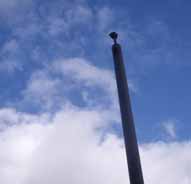Colchester Borough Council’s Cabinet is to discuss plans to go digital with its public space CCTV system in the Essex town centre, at its January 29 meeting. It’s proposed to replace its analogue CCTV. Some £250,000 would be allocated – but not necessarily all spent – to replace the analogue system with a digital platform with capacity to monitor areas in the town centre and beyond, such as Castle Park and the Northern Gateway. Some 30 extra camera locations are proposed across the town centre, ‘extending coverage to some of the areas highlighted as problem areas’, as a report to councillors puts it.
As the report points out, as in other towns still with analogue-era CCTV, it’s ‘experiencing regular breakdowns with repairs proving to be uneconomic and unsustainable in terms of availability of parts’. In other words, not upgrading comes with costs – such as an energy bill, and annual service agreement. And while de-commissioning the CCTV would save costs, as the report points out, ‘this would be dwarfed by increased costs in other council services, partner agencies and businesses from removal of this deterrent to crime and ASB [anti-social behaviour]’.
Going IP would allow the council to do more, as some in the town already want, such as ‘connect CCTV at Leisure World to a central monitoring centre’. While under the analogue system any adding to the system would require laying cable to the Town Hall, with cost and disruption to streets, going for networked CCTV ‘will align to the roll-out of the Local Full Fibre Network (LFFN) programme funded by a grant from DCMS [the Department for Culture]’. That will see a new fibre network across the town centre, ‘projected completion by the end of 2020’.
The report makes the case for CCTV on value for money grounds, for example describing CCTV as ‘a vital source of evidence and real-time assistance’, whether for community safety or tracing missing persons.
Cameras, covering 100 locations, are monitored day and night by operators working across CCTV and the Helpline service. It’s managed and operated by Colchester Amphora Trading Ltd (CATL).
If agreed, CATL would deliver and continue to operate the new system, using fibre infrastructure being rolled out after a successful bid, on behalf of the council, for £3.45m from the Government’s Local Full Fibre Network Fund to improve the town’s digital connectivity.
Councillor Theresa Higgins, Portfolio Holder for Commercial Services, said: “We are committed to investing in our Town Centre, to make it a safer and even more welcoming place where people feel comfortable to shop and enjoy their leisure time. Our ongoing work to deliver ultrafast broadband across the borough will enable us to deliver new state-of-the-art digital CCTV more economically than would have otherwise been possible.
“We know our current analogue cameras are coming to the end of their life span and don’t always provide clear enough images to help the police with prosecutions. If approved, the new digital system will play a key role in helping to reduce crime and the fear of crime across the Town Centre and other locations in the borough not yet served by existing CCTV.
“We recognise that CCTV can divide opinion, but residents and visitors should be reassured that we will continue to adhere strictly to the codes of practice that regulate public surveillance, to help prevent and detect crime and antisocial behaviour, protect vulnerable individuals and promote social and economic wellbeing, which are so important for any successful and thriving community.”
Separately, Colchester Council’s Licensing Committee is going out to consultation about proposed installation of CCTV in hackney carriage and private hire vehicles in the town. Cameras would continually record when a vehicle is in use. Councillor Mike Lilley, the council’s Portfolio Holder for Communities, Wellbeing and Public Safety, said: ““I see this as a proactive move to ensure we’re doing all we can to keep those who live, work and visit Colchester safe. Research has shown that when someone is being recorded, they are more likely to be better behaved and taxis have been known to be used for criminal activities. The footage recorded will provide invaluable evidence to enable us to take robust action against those who choose to abuse drivers and passengers or break the law.
“I recognise that the implementation of CCTV will be an additional cost for licensees, but we feel the safety of drivers and the public are paramount.” For a draft of the CCTV policy visit the council website.
The council completed its mandatory safeguarding training for licensed drivers and operators in October 2019. A report to councillors notes that continuous audio recording is not supported by the UK data privacy regulator the Information Commissioner’s Office (ICO) and hence the council’s policy is ‘aligned with the position of the ICO to permit the use of audio recording by way of a panic button only’.










